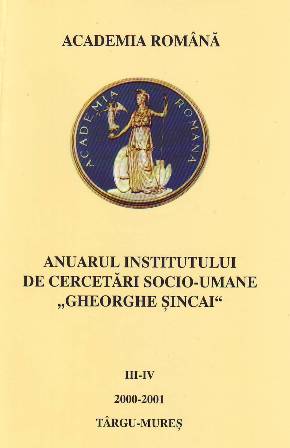Imaginea Conciliului Ecumenic Vatican I în presa românească din Transilvania (1869-1870)
The Image of the Vatican I Ecumenical Council in the Romanian Press from Transylvania (1869-1870)
Author(s): Ioan Cârja, Nicolae BocşanSubject(s): History
Published by: Institutul de Cercetări Socio-Umane Gheorghe Şincai al Academiei Române
Keywords: The Vatican 1st Ecumenical Council; Catholicism; the 19th century; the Greek-Catholic Church; Ioan Vancea from Buteasa; Iosif Papp-Szilágyi; Transylvania; the Romanian press; the Romanian national movement
Summary/Abstract: The Vatican 1st Ecumenical Council (1869-1870) is an important episode in the history of Catholicism in the 19th century and, on a broader scale, it marks out the evolution of the relations between the Church and the modern society. Two prelates represented the Romanian United Church at its proceedings: the metropolitan Ioan Vancea from Buteasa (1869-1892) and the bishop of the Oradea diocese, Iosif Papp-Szilágyi (1863-1873). The investigation of the materials related to this problem, published in the Romanian press from Transylvania, reflects an image with three important components: the general prospective, the Pope’s infallibility and the Romanian participation. The metropolitan’s personality and his activity at the Council’s proceedings occupy an important place in the examined accounts and the appreciation regarding him is in the range of superlatives. Papp-Szilagyi’s image is rendered indistinct and qualifications given to him are openly critical with regard to his activity. Both of the prelates, with different orientations towards the Council’s thesis are valued with reference to the expectations in the Greek-Catholic media and in the Romanian national movement. The opinions held by them in such problems as: the situation of the Catholic churches of Oriental rites, the Pope’s prerogatives etc. are related to the Romanian ecclesiastical and national desiderata: the maintenance of the ritual and disciplinary specific of the United Church, the resistance towards Latinization and towards the extension tendencies of Hungarian Catholic autonomy, the avoidance of attempts of Magyarization through the church, the maintenance of a real institutional autonomy, with all the consequences which could be profitable for national identity, in a zone where religion fully functions as a factor of ethnic-national identification and valuation.
Journal: Anuarul Institutului de Cercetări Socio-Umane »Gheorghe Şincai« al Academiei Române
- Issue Year: 2001
- Issue No: 03+04
- Page Range: 290-323
- Page Count: 34
- Language: Romanian

